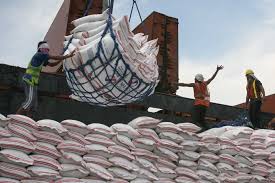By Tola Akinmutimi
The Rice Farmers Association of Nigeria (RIFAN) on Wednesday said that through the Central Bank of Nigeria’s (CBN’s) Anchor Borrowers Scheme (ABS) and other initiatives, the country had been saving about N1.2 billion daily on rice importation.
The farmer explained that members of the association would continue to work harder to justify the apex bank’s support by ensuring that imported rice don’t find their way into the nation’s market.
Goronyo also described an advertisement by one Christopher Kajere, who claimed that RIFAN members were owing him for supplies made, as an act of sabotage since the association does not deal with individual suppliers but corporate entities in all its inputs supply chains.
According to him, there is no way the apex bank or any rice farmer could have owed an individual when all RIFAN inputs or supply transactions are conducted with reputable corporate entities at all times.
The rice farmer therefore challenged the advertiser to prove his claims by coming personally to RIFAN Secretariat with evidences at his disposal, adding that unlike the ‘unknown’ supplier, all registered RIFAN suppliers and service providers are even ready to supply inputs on credit for as long as possible based on the very healthy transaction relationship between them and rice farmers.
The RIFAN leader said: “Today, through the CBN’s supports, especially the Anchor Borrowers Scheme, I can say Nigeria is saving N1.2 billion daily on rice importation. RIFAN has benefitted substantially from the scheme and this has enabled our members to produce enough rice that can feed the nation.”









